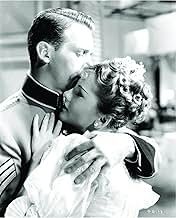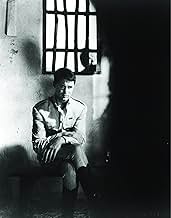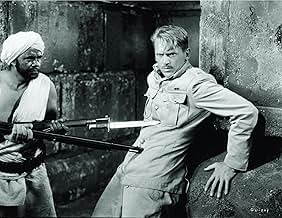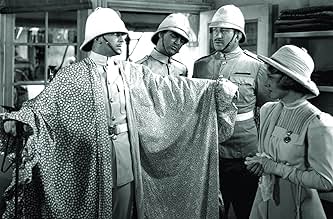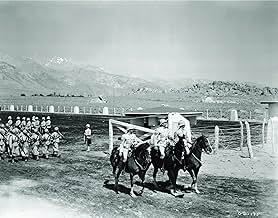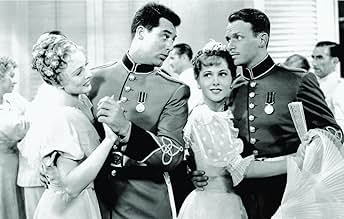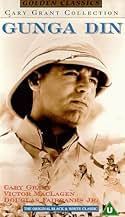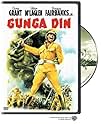VALUTAZIONE IMDb
7,2/10
13.352
LA TUA VALUTAZIONE
Nell'India del XIX secolo, tre soldati britannici e un portatore d'acqua nativo devono fermare il risveglio di massa segreto del culto omicida dei thug prima che possa coinvolgere tutto il t... Leggi tuttoNell'India del XIX secolo, tre soldati britannici e un portatore d'acqua nativo devono fermare il risveglio di massa segreto del culto omicida dei thug prima che possa coinvolgere tutto il territorio.Nell'India del XIX secolo, tre soldati britannici e un portatore d'acqua nativo devono fermare il risveglio di massa segreto del culto omicida dei thug prima che possa coinvolgere tutto il territorio.
- Regia
- Sceneggiatura
- Star
- Premi
- 4 vittorie totali
Charles Bennett
- Telegraph Operator
- (non citato nei titoli originali)
Gene Coogan
- Lancer
- (non citato nei titoli originali)
Jimmy Dime
- Thug
- (non citato nei titoli originali)
George Du Count
- Pandu Lal
- (non citato nei titoli originali)
Anna May the Elephant
- Elephant
- (non citato nei titoli originali)
Recensioni in evidenza
10slokes
Anyone with a young boy in the house who won't watch black & white movies should put this on their television set. When the child walks by, wondering what all the on screen shouting and shooting's about, tell him this is a picture for adults and that he isn't big enough to watch it yet. That'll hold him there for a few minutes; director George Stevens and his team will keep him to the end.
I think my father did that to me, anyway, and I'm the better man for it. This classic adventure yarn, set in India during the British occupation, features a trio of Army sergeants who find their tight union facing dissolution as one prepares to marry his sweetheart. Help arrives in the form of a vicious Thuggie revolt that the soldiers find themselves united against.
"Gunga Din" was one of the great movies to come out of Hollywood's finest year, 1939. Even more than most great movies from that Golden year, it is entertaining in a very immediate and accessible way. The theme music is instant hummable nirvana. While shot in California, the camera work (the only thing in "Gunga Din" that got so much as an Oscar nomination) has a windblown grandeur that feels very much like the Raj of a hundred years before. The battle scenes are shot in a very realistic manner, not too violent but very messy as people fall and shoot and run in all corners of each frame in a way that feels real, not staged like some Cecil B. DeMille Biblical slaughter fest.
The script doesn't just set up action scenes, it also develops the relationship of the three sergeants with great dollops of humor. The main focus is on Sgt. Cutter, chasing after tall tales of golden treasures. It's a rare actioner for Cary Grant, and his lightness is just right for a film that never takes itself seriously even as it develops taut suspense.
Anchoring the trio is Sgt. MacChesney (Victor McLaglen), who dotes over his elephant Annie and tries to protect Cutter from his own hare-brained schemes. He's just as funny in his own way, leaving Sgt. Ballantine (Douglas Fairbanks Jr., displaying some nice Errol Flynnish dash) as the one with the love interest and grounding enough to know he needs to chuck his boyish pals and grow up.
If "Gunga Din" was a Lifetime movie, it would be about Joan Fontaine's efforts to save her man from his two loser friends and their skull crushing hijinks. But since it's a guys' film, the accent here is on how the threesome must stay together and save Ballantine from a fate worse than death, not only marriage, but as Cutter indignantly exclaims several times, the tea business, too.
The political correctness police are hard on this film, not so much for the gender issue but the idea of British soldiers saving poor Indians from the vicious Thuggies. It reeks of colonial apologia. Thankfully, this film was made back when, and the producers thus felt no need to spell out the obvious liberalism at the heart of the film, that these three sergeants, so full of derring-do and false racial pride, have to be saved along with the rest of their army by a humble bhisti that only one of the three had any time for when he sought their approval. After all, for all their swashbuckling glory, the film's true sacrifice involves the title character, played so heart-wrenchingly by Sam Jaffe.
Back when this film was made, movie mogul Jack Warner had a saying: You want to send a message, use Western Union. Still, it seems like the messages were flying fast and furious in "Gunga Din." I watch the film now and wonder if audiences back then were meant to wonder what Gunga Din was really up to when he led Cutter to the golden temple. Was he really plotting revenge against his British overlords? Would he have been justified in doing so, especially given MacChesney's cold treatment of him? When Col. Weed delivers that eulogy, the poem by Rudyard Kipling on which the film is loosely based, was it with a nod in the direction of imperialism's folly, of lording it over someone who proved "a better man than I am" in the end? What did they make of the Guru's great speech, delivered in perfect clipped English: "You have sworn an oath as soldiers to maybe die for a faith, which is your country, England. Well, I can die for my country and my faith as readily as you...India, farewell."
Of course, the same character also instructs his brutal followers: "Kill for the love of killing! Kill for the love of Kali! Kill! Kill! Kill!" Which means we are allowed to hate him and root for the British, and save the questions about what it all means for later.
What "Gunga Din" means to me, most of all, is the quickest, surest 90-minute thrill ride on video. Cutter never found his golden temple, but there's one for all of us watching "Gunga Din."
I think my father did that to me, anyway, and I'm the better man for it. This classic adventure yarn, set in India during the British occupation, features a trio of Army sergeants who find their tight union facing dissolution as one prepares to marry his sweetheart. Help arrives in the form of a vicious Thuggie revolt that the soldiers find themselves united against.
"Gunga Din" was one of the great movies to come out of Hollywood's finest year, 1939. Even more than most great movies from that Golden year, it is entertaining in a very immediate and accessible way. The theme music is instant hummable nirvana. While shot in California, the camera work (the only thing in "Gunga Din" that got so much as an Oscar nomination) has a windblown grandeur that feels very much like the Raj of a hundred years before. The battle scenes are shot in a very realistic manner, not too violent but very messy as people fall and shoot and run in all corners of each frame in a way that feels real, not staged like some Cecil B. DeMille Biblical slaughter fest.
The script doesn't just set up action scenes, it also develops the relationship of the three sergeants with great dollops of humor. The main focus is on Sgt. Cutter, chasing after tall tales of golden treasures. It's a rare actioner for Cary Grant, and his lightness is just right for a film that never takes itself seriously even as it develops taut suspense.
Anchoring the trio is Sgt. MacChesney (Victor McLaglen), who dotes over his elephant Annie and tries to protect Cutter from his own hare-brained schemes. He's just as funny in his own way, leaving Sgt. Ballantine (Douglas Fairbanks Jr., displaying some nice Errol Flynnish dash) as the one with the love interest and grounding enough to know he needs to chuck his boyish pals and grow up.
If "Gunga Din" was a Lifetime movie, it would be about Joan Fontaine's efforts to save her man from his two loser friends and their skull crushing hijinks. But since it's a guys' film, the accent here is on how the threesome must stay together and save Ballantine from a fate worse than death, not only marriage, but as Cutter indignantly exclaims several times, the tea business, too.
The political correctness police are hard on this film, not so much for the gender issue but the idea of British soldiers saving poor Indians from the vicious Thuggies. It reeks of colonial apologia. Thankfully, this film was made back when, and the producers thus felt no need to spell out the obvious liberalism at the heart of the film, that these three sergeants, so full of derring-do and false racial pride, have to be saved along with the rest of their army by a humble bhisti that only one of the three had any time for when he sought their approval. After all, for all their swashbuckling glory, the film's true sacrifice involves the title character, played so heart-wrenchingly by Sam Jaffe.
Back when this film was made, movie mogul Jack Warner had a saying: You want to send a message, use Western Union. Still, it seems like the messages were flying fast and furious in "Gunga Din." I watch the film now and wonder if audiences back then were meant to wonder what Gunga Din was really up to when he led Cutter to the golden temple. Was he really plotting revenge against his British overlords? Would he have been justified in doing so, especially given MacChesney's cold treatment of him? When Col. Weed delivers that eulogy, the poem by Rudyard Kipling on which the film is loosely based, was it with a nod in the direction of imperialism's folly, of lording it over someone who proved "a better man than I am" in the end? What did they make of the Guru's great speech, delivered in perfect clipped English: "You have sworn an oath as soldiers to maybe die for a faith, which is your country, England. Well, I can die for my country and my faith as readily as you...India, farewell."
Of course, the same character also instructs his brutal followers: "Kill for the love of killing! Kill for the love of Kali! Kill! Kill! Kill!" Which means we are allowed to hate him and root for the British, and save the questions about what it all means for later.
What "Gunga Din" means to me, most of all, is the quickest, surest 90-minute thrill ride on video. Cutter never found his golden temple, but there's one for all of us watching "Gunga Din."
For years I thought this knockabout service comedy was a product of John Ford, especially with Victor McLaglen as one of the leads. It certainly has the same rough house humor that Ford laces his films with.
To my surprise I learned it was George Stevens who actually directed it. Still I refuse to believe that this film wasn't offered to John Ford, but he was probably off in Monument Valley making Stagecoach.
Victor McLaglen along with Cary Grant and Douglas Fairbanks, Jr., play three sergeants in the Indian Army who have a nice buddy/buddy/buddy camaraderie going. But the old gang is breaking up because Fairbanks is engaged to marry Joan Fontaine. Not if his two pals can help it, aided and abetted by regimental beastie Gunga Din as played by Sam Jaffe.
The Rudyard Kipling poem served as the inspiration for this RKO film about barracks life in the British Raj. The comic playing of the leads is so good that it does overshadow the incredibly racist message of the film. Not that the makers were racist, but this was the assumption of the British there at the time, including our leads and Gunga Din shows this most effectively.
The British took India by increments, making deals here and there with local rulers under a weak Mogul emperor who was done away with in the middle of the 19th century. They ruled very little of India outright, that would have been impossible. Their rule depended on the native troops you see here. Note that the soldiers cannot rise above the rank of corporal and Gunga Din is considerably lower in status than that.
Note here that the rebels in fact are Hindu, not Moslem. There are as many strains of that religion as there are Christian sects and this strangling cult was quite real. Of course to those being strangled they might not have the same view of them as liberators. But until India organized its independence movement, until the Congress Party came into being, these people were the voice of a free India.
But however you slice it, strangling people isn't a nice thing to do and the British had their point here also. When I watch Gunga Din, I think of Star Trek and the reason the prime directive came into being.
Cary Grant got to play his real cockney self here instead of the urbane Cary we're used to seeing. Fairbanks and McLaglen do very well with roles completely suited to their personalities.
Best acting role in the film however is Eduard Ciannelli as the guru, the head of the strangler cult. Note the fire and passion in his performance, he blows everyone else off the screen when he's on.
Favorite scene in Gunga Din is Ciannelli exhorting his troops in their mountain temple. Note how Stevens progressively darkens the background around Ciannelli until all you see are eyes and teeth like a ghoulish Halloween mask. Haunting, frightening and very effective.
It was right after the action of this film in the late nineteenth century that more and more of the British public started to question the underlying assumptions justifying the Raj. But that's the subject of Gandhi.
Gunga Din is still a great film, entertaining and funny. It should be shown with A Passage to India and Gandhi and you can chart how the Indian independence movement evolved.
To my surprise I learned it was George Stevens who actually directed it. Still I refuse to believe that this film wasn't offered to John Ford, but he was probably off in Monument Valley making Stagecoach.
Victor McLaglen along with Cary Grant and Douglas Fairbanks, Jr., play three sergeants in the Indian Army who have a nice buddy/buddy/buddy camaraderie going. But the old gang is breaking up because Fairbanks is engaged to marry Joan Fontaine. Not if his two pals can help it, aided and abetted by regimental beastie Gunga Din as played by Sam Jaffe.
The Rudyard Kipling poem served as the inspiration for this RKO film about barracks life in the British Raj. The comic playing of the leads is so good that it does overshadow the incredibly racist message of the film. Not that the makers were racist, but this was the assumption of the British there at the time, including our leads and Gunga Din shows this most effectively.
The British took India by increments, making deals here and there with local rulers under a weak Mogul emperor who was done away with in the middle of the 19th century. They ruled very little of India outright, that would have been impossible. Their rule depended on the native troops you see here. Note that the soldiers cannot rise above the rank of corporal and Gunga Din is considerably lower in status than that.
Note here that the rebels in fact are Hindu, not Moslem. There are as many strains of that religion as there are Christian sects and this strangling cult was quite real. Of course to those being strangled they might not have the same view of them as liberators. But until India organized its independence movement, until the Congress Party came into being, these people were the voice of a free India.
But however you slice it, strangling people isn't a nice thing to do and the British had their point here also. When I watch Gunga Din, I think of Star Trek and the reason the prime directive came into being.
Cary Grant got to play his real cockney self here instead of the urbane Cary we're used to seeing. Fairbanks and McLaglen do very well with roles completely suited to their personalities.
Best acting role in the film however is Eduard Ciannelli as the guru, the head of the strangler cult. Note the fire and passion in his performance, he blows everyone else off the screen when he's on.
Favorite scene in Gunga Din is Ciannelli exhorting his troops in their mountain temple. Note how Stevens progressively darkens the background around Ciannelli until all you see are eyes and teeth like a ghoulish Halloween mask. Haunting, frightening and very effective.
It was right after the action of this film in the late nineteenth century that more and more of the British public started to question the underlying assumptions justifying the Raj. But that's the subject of Gandhi.
Gunga Din is still a great film, entertaining and funny. It should be shown with A Passage to India and Gandhi and you can chart how the Indian independence movement evolved.
Although I'm usually only mildly appalled reading through user comments on movies on imdb.com some of the comments made here about this classic movie exhibit a true nadir of ignorance of history in general and movies in particular. E.g.;
1 - I'm particularly struck by the comment - "This movie is shot on location in California because shooting in India would have been too expensive." Prior to the 1950's Hollywood movies were rarely (and I mean rarely) shot on the original location sites. The problem was not expense (although the moguls certainly were pinching the pennies), the problem was transportation! Transporting a movie production company halfway around the world would have been nearly impossible to accomplish (let alone how long it would have taken and then they would have been shooting under impossible conditions in India anyway) not to mention that WWII was on the verge of breaking out! The biggest movie of that year was shot on a set in Culver City, CA where they could easily manipulate the filming. Even if they had sent the production company to Atlanta they couldn't very well burn down Atlanta for authenticity' sake now could they? They would have had to have built a set(s) in Atlanta - why would they go all the way across the country to do that when they could do it Culver City?
2 - Several people lament that Gunga Din was not shot in color. A little movie history context here - first of all, the first full length feature film shot in color had only been done 4 years earlier, secondly three-strip technicolor was outrageously expensive in 1939 (only one other movie was shot that year in technicolor and it didn't start making back its costs until the late 1960's) and the few features shot prior to that year in color had failed miserably to make back their production costs. And finally, the studios had no faith in color (just as they had resisted "talkies" a decade earlier) - they were in business to make money, not experiment with an innovation that had not yet been accepted and proven to bring in a bigger audience. Also, there was a comment about the graininess of the B&W cinematography of GD - that's because 99% of the present day viewers are seeing multi-generation copies that have been played to death! Get a fresh, first generation copy to see the B&W shading in its true brightness, focus and clarity and that objection will go away. BTW - the colorized version of GD is abysmal - faded coloring effects and indistinct edges make it look like a sloppy water color painting!
3 - Labelling anything from the past as not being PC only shows the lack of historical context knowledge so rampant in the present day. First of all this movie was loosely based on a poem that was already 47 years old when this movie was released. If you change the politics to match the present day conception of "correctness" then you really don't have the original concept do you? Not to mention that America was a far different place racially (and socially) in 1939. There are movies being released in 2003 that will catch hell 50 years from now for their "politics" - just chalk it up to the ignorance of future generations to not recognize what the history of the times were. I do like the analysis by one writer though that far from being a reactionary screed the movie went further than the poem in emphasizing that Gunga Din was far better off in his position than he would have been otherwise. After all, he was an "untouchable", a social postion that was abused, exploited and terrorized by their fellow Indians for thousands of years. Whatever one might think of his treatment by the British it was a high step up from what he would have endured out in his own society! Which brings me to.........
4 - ..........the ridiculously misguided (and just plain wrong) observations about the Thuggees of India being "freedom fighters", this couldn't be more wrong. Several of the commentators really need to read up on Indian history - the Thuggees had been ritualistic murderers and thieves for thousands of years in India before the British ever arrived! If they had any support from various rulers of parts of India it was because those rulers either feared for their own positions or they could get the Thuggees to do their dirty work for them - for a high price of course. The Thuggees reputation for brutality, unabated crimes of the worst kind and general, overall lack of human attributes make most other singlemindedly evil groups throughout history (even in the present day) look like amateurs! The reason they fought the British so vociferously was that the British recognized this and fought to suppress them - I seriously doubt that many Indians lamented that suppression. And to the person who equated the Thuggees with French Resistance fighters killing "collaborators" - where did you get such a preposterous idea? Do you know anything at all about the history of the Indian sub-continent?
Let me also point out here that it is the British who are the infidels not the "natives", just another example of how mixed up one can be about who is who and understanding what history and meaning really are.
I especially love the reviewers who spend their time comparing this to another movie that they like better in order to dis this one - so they review the other movie instead. Why bother, movies stand on their own, you either like them or you don't, go watch the other one you like instead.
5 - Now, everyone is entitled to their opinion, which I certainly support, as to whether this is a "good" or a "bad" movie (opinions are like.......well, you know) but fergawdsakes base that opinion on an informed knowledge of the times, the historical context of the work and the realization that movies are just movies - they aren't "real" and they certainly make up whatever "truth" and "facts" they see fit!
My opinion? This is one of the great "entertainment" movies ever made - the reason to go to the movies I thought? It has everything - a good script, a good story, epic sweep, fantastic acting, inter-character chemistry, charisma, pacing and coherency. How many movies can you say that about? And kudos to those who see this movie for what it is, not what they want it to be!
1 - I'm particularly struck by the comment - "This movie is shot on location in California because shooting in India would have been too expensive." Prior to the 1950's Hollywood movies were rarely (and I mean rarely) shot on the original location sites. The problem was not expense (although the moguls certainly were pinching the pennies), the problem was transportation! Transporting a movie production company halfway around the world would have been nearly impossible to accomplish (let alone how long it would have taken and then they would have been shooting under impossible conditions in India anyway) not to mention that WWII was on the verge of breaking out! The biggest movie of that year was shot on a set in Culver City, CA where they could easily manipulate the filming. Even if they had sent the production company to Atlanta they couldn't very well burn down Atlanta for authenticity' sake now could they? They would have had to have built a set(s) in Atlanta - why would they go all the way across the country to do that when they could do it Culver City?
2 - Several people lament that Gunga Din was not shot in color. A little movie history context here - first of all, the first full length feature film shot in color had only been done 4 years earlier, secondly three-strip technicolor was outrageously expensive in 1939 (only one other movie was shot that year in technicolor and it didn't start making back its costs until the late 1960's) and the few features shot prior to that year in color had failed miserably to make back their production costs. And finally, the studios had no faith in color (just as they had resisted "talkies" a decade earlier) - they were in business to make money, not experiment with an innovation that had not yet been accepted and proven to bring in a bigger audience. Also, there was a comment about the graininess of the B&W cinematography of GD - that's because 99% of the present day viewers are seeing multi-generation copies that have been played to death! Get a fresh, first generation copy to see the B&W shading in its true brightness, focus and clarity and that objection will go away. BTW - the colorized version of GD is abysmal - faded coloring effects and indistinct edges make it look like a sloppy water color painting!
3 - Labelling anything from the past as not being PC only shows the lack of historical context knowledge so rampant in the present day. First of all this movie was loosely based on a poem that was already 47 years old when this movie was released. If you change the politics to match the present day conception of "correctness" then you really don't have the original concept do you? Not to mention that America was a far different place racially (and socially) in 1939. There are movies being released in 2003 that will catch hell 50 years from now for their "politics" - just chalk it up to the ignorance of future generations to not recognize what the history of the times were. I do like the analysis by one writer though that far from being a reactionary screed the movie went further than the poem in emphasizing that Gunga Din was far better off in his position than he would have been otherwise. After all, he was an "untouchable", a social postion that was abused, exploited and terrorized by their fellow Indians for thousands of years. Whatever one might think of his treatment by the British it was a high step up from what he would have endured out in his own society! Which brings me to.........
4 - ..........the ridiculously misguided (and just plain wrong) observations about the Thuggees of India being "freedom fighters", this couldn't be more wrong. Several of the commentators really need to read up on Indian history - the Thuggees had been ritualistic murderers and thieves for thousands of years in India before the British ever arrived! If they had any support from various rulers of parts of India it was because those rulers either feared for their own positions or they could get the Thuggees to do their dirty work for them - for a high price of course. The Thuggees reputation for brutality, unabated crimes of the worst kind and general, overall lack of human attributes make most other singlemindedly evil groups throughout history (even in the present day) look like amateurs! The reason they fought the British so vociferously was that the British recognized this and fought to suppress them - I seriously doubt that many Indians lamented that suppression. And to the person who equated the Thuggees with French Resistance fighters killing "collaborators" - where did you get such a preposterous idea? Do you know anything at all about the history of the Indian sub-continent?
Let me also point out here that it is the British who are the infidels not the "natives", just another example of how mixed up one can be about who is who and understanding what history and meaning really are.
I especially love the reviewers who spend their time comparing this to another movie that they like better in order to dis this one - so they review the other movie instead. Why bother, movies stand on their own, you either like them or you don't, go watch the other one you like instead.
5 - Now, everyone is entitled to their opinion, which I certainly support, as to whether this is a "good" or a "bad" movie (opinions are like.......well, you know) but fergawdsakes base that opinion on an informed knowledge of the times, the historical context of the work and the realization that movies are just movies - they aren't "real" and they certainly make up whatever "truth" and "facts" they see fit!
My opinion? This is one of the great "entertainment" movies ever made - the reason to go to the movies I thought? It has everything - a good script, a good story, epic sweep, fantastic acting, inter-character chemistry, charisma, pacing and coherency. How many movies can you say that about? And kudos to those who see this movie for what it is, not what they want it to be!
While it is fashionable in too many circles to condemn anything which portrays European colonialism generally, and the British Empire specifically, in a favorable light, a little historical knowledge will show that Kipling's story, as well as this superb film, are hardly the reactionary racist screed some would like to demote them to. Gunga Din is a regimental bhisti - a water carrier - and in 19th century India that meant that he had a job which guaranteed a place to sleep and food in a very brutal society. Considering that he was also an "untouchable" - a member of India's lowest caste - this was something. Colonel Weed is correct in saying "he had no official status as a soldier" - bhistis were non-military auxiliaries. As for his loyalty to the British, there were many Indians who clearly preferred British rule to that of their fellows - and not just the maharajas and princes.
If you read the story - and watch the movie with an objective eye - at the end, all the major characters have nothing but respect for Gunga Din. Sergeant MacChesney (Victor McLaglen) is clearly shamed by the fact that Din, in the end, was not only the better soldier but the better man - he sacrificed himself to prevent the ambush and massacre of the British column. The most telling example that the movie doesn't "put down" Gunga Din is at the end when Colonel Weed posthumously appoints the former regimental bhisti as a Corporal in the regiment. Corporal was a BRITISH rank - the equivalent Indian rank was Havildar. So, he was appointed as a BRITISH non-commissioned officer who could command British troops - hardly an example of political incorrectness.
Yes, this is "men-as-buddies" flick. However, this movie has a special appeal to anyone who has actually served in the military - those are the types of friendships you make (you'll share your last drop of water with your mess mate) and keep for the rest of your days. It acknowledges that. So enjoy it - it is a rousing tale - and keep the PC-nonsense out of it. The bad guys lose in the end while the best man is recognized for his virtues - you don't even get that it in real life.
If you read the story - and watch the movie with an objective eye - at the end, all the major characters have nothing but respect for Gunga Din. Sergeant MacChesney (Victor McLaglen) is clearly shamed by the fact that Din, in the end, was not only the better soldier but the better man - he sacrificed himself to prevent the ambush and massacre of the British column. The most telling example that the movie doesn't "put down" Gunga Din is at the end when Colonel Weed posthumously appoints the former regimental bhisti as a Corporal in the regiment. Corporal was a BRITISH rank - the equivalent Indian rank was Havildar. So, he was appointed as a BRITISH non-commissioned officer who could command British troops - hardly an example of political incorrectness.
Yes, this is "men-as-buddies" flick. However, this movie has a special appeal to anyone who has actually served in the military - those are the types of friendships you make (you'll share your last drop of water with your mess mate) and keep for the rest of your days. It acknowledges that. So enjoy it - it is a rousing tale - and keep the PC-nonsense out of it. The bad guys lose in the end while the best man is recognized for his virtues - you don't even get that it in real life.
In the most general of terms Gunga Din not only qualifies as a classic but more or less defines the term "classic" in every respect. I wouldn't know how to fault this film, as it succeeds on every level.
You begin with a workable idea for a story. Then you follow that up with superb script writing, direction and photography, and wonderful performances by the entire cast. The end result of that collaboration of successful effort is, as it must be . . . a classic.
And not only does Gunga Din succeed as a mere action adventure, which would be impressive enough, but it's comedic relief serves as a virtual workshop for aspiring directors who, lamentably today, just don't seem to get that part of the equation in all too many cases--you know, as in movie-making is an art? Or at least it used to be.
There's seems to be a gap in our society's culture when it comes to the enjoyment of art which attempts to communicate on various intellectual levels. I would put this down to dubious education all around if I had to pick just one culprit, but I don't know, maybe that's too simplistic. I experience fear, though, when I read negative comments from viewers of films as rich in various, and to me obvious, qualities as is Gunga Din. All I hear in these cases, at best, is a fundamental lack of artistic appreciation at base.
Well, for these people I imagine that all that's left is to simply go out and buy the cheap remakes of the classic films, which are, of course, a dime a dozen nowadays. And then I suppose they will get what they need: presumably a package of questionable casting, incompetent direction, in many instances virtually no attempt at intelligent character development whatsoever, along with x-many minutes of gratuitous violence and endless smash-ups, replete, of course, with plenty of LFE icing for this new-age filmic cake.
Meanwhile, I hope that my daughter will come to appreciate the great films such as Gunga Din for the classic productions they were upon release, and which they certainly remain today.
You begin with a workable idea for a story. Then you follow that up with superb script writing, direction and photography, and wonderful performances by the entire cast. The end result of that collaboration of successful effort is, as it must be . . . a classic.
And not only does Gunga Din succeed as a mere action adventure, which would be impressive enough, but it's comedic relief serves as a virtual workshop for aspiring directors who, lamentably today, just don't seem to get that part of the equation in all too many cases--you know, as in movie-making is an art? Or at least it used to be.
There's seems to be a gap in our society's culture when it comes to the enjoyment of art which attempts to communicate on various intellectual levels. I would put this down to dubious education all around if I had to pick just one culprit, but I don't know, maybe that's too simplistic. I experience fear, though, when I read negative comments from viewers of films as rich in various, and to me obvious, qualities as is Gunga Din. All I hear in these cases, at best, is a fundamental lack of artistic appreciation at base.
Well, for these people I imagine that all that's left is to simply go out and buy the cheap remakes of the classic films, which are, of course, a dime a dozen nowadays. And then I suppose they will get what they need: presumably a package of questionable casting, incompetent direction, in many instances virtually no attempt at intelligent character development whatsoever, along with x-many minutes of gratuitous violence and endless smash-ups, replete, of course, with plenty of LFE icing for this new-age filmic cake.
Meanwhile, I hope that my daughter will come to appreciate the great films such as Gunga Din for the classic productions they were upon release, and which they certainly remain today.
Lo sapevi?
- QuizThe gong in the title sequence is the same one used to summon King Kong six years earlier.
- BlooperBallantine and MacChesney are bound and gagged when the last Thuggee is about to behead them after Gunga Din sounds the alarm. Cutter shoots the Thuggee and Ballantine and MacChesney are unbound as they rush to Cutter's side.
- Citazioni
Sgt. Thomas 'Tommy' Ballantine: You displease me greatly, and I ignore the both of you.
- Curiosità sui creditiThe credits appear on a gong. Standing next to the gong is a Hindu man, and every time he strikes the gong, the credits change.
- Versioni alternativeGerman theatrical version was cut by approx. 12 minutes. This version was later shown on TV but never released on any home media format. Only in 2018 the film was released on DVD, with approx. 4 minutes restored.
- ConnessioniFeatured in I giovani arrabbiati (1959)
I più visti
Accedi per valutare e creare un elenco di titoli salvati per ottenere consigli personalizzati
- How long is Gunga Din?Powered by Alexa
Dettagli
- Data di uscita
- Paese di origine
- Lingua
- Celebre anche come
- Aufstand in Sidi Hakim
- Luoghi delle riprese
- Azienda produttrice
- Vedi altri crediti dell’azienda su IMDbPro
Botteghino
- Budget
- 1.910.000 USD (previsto)
- Tempo di esecuzione1 ora 57 minuti
- Colore
- Proporzioni
- 1.37 : 1
Contribuisci a questa pagina
Suggerisci una modifica o aggiungi i contenuti mancanti



